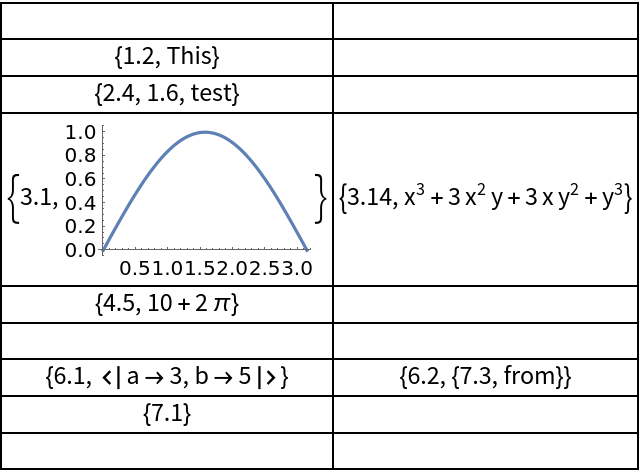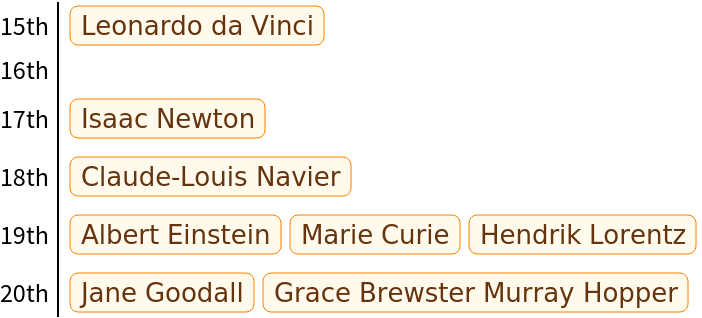Basic Examples (4)
Bin some data based only on the first element of each list:
Bin a list of data based on the string length of each item:
Bin some data based on the total of each list:
Bin some data with some "auxiliary" data:
Scope (3)
Perform a 2-dimensional binning based on the value of the first element, and the string length of the last element:
Perform a 3-dimensional binning based on the value of the first element, the value of the middle element, and the length of the last element:
The lists do not need to have the same length, structure, or type, allowing to bin data with auxiliary data:
Applications (5)
Bin some data based on the number of unique letters in each string:
Bin complex numbers based on their imaginary and real parts:
Bin some strings based on their first letter:
Bin some person entities based on their birth century:
Bin some associations based on age:
Properties and Relations (2)
BinLists can sometimes perform similar tasks as BinListsBy by giving a single large bin in the "other" dimensions:
GatherBy gives similar output as BinListsBy, but BinListsBy always returns an output with the same dimensions, the bins are sorted, and includes empty lists where necessary:
Explicitly check they return the same:
Possible Issues (2)
If the function does not return a number it will not be binned:
Values outside the binning range are discarded:
Neat Examples (2)
Bin some datasets based on their regressed slope:
Plot the datasets with similar slopes together:



![data = {{7.2, <|"Name" -> "Sander", "Age" -> Missing["Disputed"]|>}, {5.1, <|"Name" -> "Tanya", "Age" -> 25|>}, {2.5, <|"Name" -> "Eric", "Age" -> 41|>}, {3.1, <|
"Name" -> "Paul", "Age" -> 20|>}, {5.4, <|"Name" -> "Henry", "Age" -> 72|>}, {7.1, <|"Name" -> "Emma", "Age" -> 42|>}, {6.2, <|
"Name" -> "Natalie", "Age" -> 31|>}};
ResourceFunction["BinListsBy"][data, {First, 1, 10}] // Column](https://www.wolframcloud.com/obj/resourcesystem/images/849/84989bac-a3ee-46ae-81f1-a0dd95c01de5/60a20e494914cd55.png)

![data = {{1.2, 2.3, "This"}, {5.1, 1.2, "is"}, {4.5, 3.1, "just"}, {3.1, 1.87, "some"}, {2.4, 1.6, "test"}, {7.1, 1.4, "data"}, {6.2, 7.3, "from"}, {3.14, 9.1, "Sander"}, {-0.7, 0.8, "ok?"}};
ResourceFunction["BinListsBy"][
data, {First, -2, 8}, {StringLength@*Last, 1, 7, 1}];
Grid[%, Frame -> All]](https://www.wolframcloud.com/obj/resourcesystem/images/849/84989bac-a3ee-46ae-81f1-a0dd95c01de5/3da6d65d471ce701.png)

![data = {{1.2, 2.3, "This"}, {5.1, 1.2, "is"}, {4.5, 3.1, "just"}, {3.1, 1.87, "some"}, {2.4, 1.6, "test"}, {7.1, 1.4, "data"}, {6.2, 7.3, "from"}, {3.14, 9.1, "Sander"}, {-0.7, 0.8, "ok?"}};
ResourceFunction[
"BinListsBy"][data, {First, -2, 8}, {#[[2]] &, 0, 10, 5}, {StringLength@*Last, 1, 7, 1}]](https://www.wolframcloud.com/obj/resourcesystem/images/849/84989bac-a3ee-46ae-81f1-a0dd95c01de5/183d29619afb9886.png)

![data = {
{1.2, "This"},
{6.1, <|"a" -> 3, "b" -> 5|>},
{4.5, 10 + 2 Pi},
{3.1, Plot[Sin[x], {x, 0, Pi}, ImageSize -> 125]},
{2.4, 1.6, "test"},
{7.1},
{6.2, {7.3, "from"}},
{3.14, Expand[(x + y)^3]}
};
Grid[ResourceFunction["BinListsBy"][data, {First, 0, 9}], Frame -> All]](https://www.wolframcloud.com/obj/resourcesystem/images/849/84989bac-a3ee-46ae-81f1-a0dd95c01de5/73df39bbef455a57.png)

![SeedRandom[1234];
data = RandomComplex[{0, 4 + 4 I}, 30];
out = ResourceFunction["BinListsBy"][data, {Im, 0, 4}, {Re, 0, 4}];
Grid[Map[Column, out, {2}], Frame -> All]](https://www.wolframcloud.com/obj/resourcesystem/images/849/84989bac-a3ee-46ae-81f1-a0dd95c01de5/18949a03a1623169.png)

![data = {"about", "votive", "pink-slipped", "ungodly", "perceptual", "zenzizenzizenzic", "superconducting", "snared", "comate"};
out = ResourceFunction["BinListsBy"][
data, {First@*LetterNumber@*ToLowerCase, 1, 27}];
TableForm[out, TableHeadings -> {CharacterRange["a", "z"]}]](https://www.wolframcloud.com/obj/resourcesystem/images/849/84989bac-a3ee-46ae-81f1-a0dd95c01de5/635ce879b18490af.png)

![data = {Entity["Person", "AlbertEinstein::6tb7g"], Entity["Person", "JaneGoodall::4k9zt"], Entity["Person", "Claude-LouisNavier::2g48v"], Entity["Person", "MarieCurie::v9f84"], Entity["Person", "IsaacNewton::bhz5x"], Entity["Person", "GraceBrewsterMurrayHopper::g9sk6"], Entity["Person", "LeonardoDaVinci::47w36"], Entity["Person", "HendrikLorentz::765z3"]};
out = ResourceFunction["BinListsBy"][
data, {DateValue[#["BirthDate"], "Year"] &, 1401, 2001, 100}];
TableForm[Row /@ out, TableHeadings -> {ToString[#] <> "th" & /@ Range[15, 20]}]](https://www.wolframcloud.com/obj/resourcesystem/images/849/84989bac-a3ee-46ae-81f1-a0dd95c01de5/469cdc2800e9b46a.png)

![data = {
<|"Name" -> "Albert", "Age" -> 76, "Occupation" -> "Physicist"|>,
<|"Name" -> "Bernard", "Age" -> 64, "Occupation" -> "Physicist"|>,
<|"Name" -> "Claude", "Age" -> 51, "Occupation" -> "Mathematical Physicist"|>,
<|"Name" -> "Marie", "Age" -> 66, "Occupation" -> "Physicist, Chemist"|>,
<|"Name" -> "Grace", "Age" -> 85, "Occupation" -> "Computer scientist"|>};
Grid[ResourceFunction["BinListsBy"][data, {#["Age"] &, 0, 100, 10}], Frame -> All]](https://www.wolframcloud.com/obj/resourcesystem/images/849/84989bac-a3ee-46ae-81f1-a0dd95c01de5/20c9744ea0ff5194.png)

![data = {{29, 48}, {76, 70}, {37, 78}, {60, 63}, {83, 0}, {42, 44}, {26, 77}, {59, 91}, {93, 46}, {38, 24}, {30, 97}, {76, 60}, {98, 50}, {35, 2}, {22, 17}, {90, 90}, {90, 67}, {34, 22}, {97, 26}, {78, 85}, {70, 55}, {59, 92}, {15, 66}, {30, 84}, {45, 48}, {91, 13}, {69, 94}, {10, 100}, {97, 40}, {91, 87}, {74, 24}, {66, 91}, {9, 93}, {67, 2}, {44, 22}, {54, 96}, {67, 13}, {23, 12}, {88, 2}, {35, 82}, {76, 64}, {84, 32}, {62, 5}, {56, 84}, {88, 68}, {25, 99}, {41, 13}, {23, 4}, {40, 14}, {89, 90}};
ResourceFunction["BinListsBy"][data, {First, 0, 100, 10}] === BinLists[data, {0, 100, 10}, {-1000, 1000, 2000}][[All, 1]]](https://www.wolframcloud.com/obj/resourcesystem/images/849/84989bac-a3ee-46ae-81f1-a0dd95c01de5/70b4fcbdfc439d4b.png)
![SeedRandom[1];
data = Table[t = RandomReal[{2, 8}]; Table[t x + RandomReal[{-1, 1}], {x, 0, 10}], 6];
out = ResourceFunction["BinListsBy"][
data, {LinearModelFit[#, x, x]["BestFitParameters"][[2]] &, 1, 10, 1}]](https://www.wolframcloud.com/obj/resourcesystem/images/849/84989bac-a3ee-46ae-81f1-a0dd95c01de5/7c9183ccd7bf8574.png)

